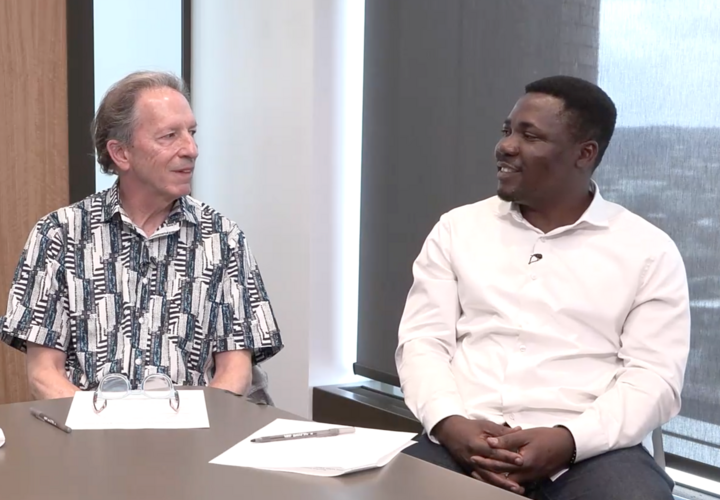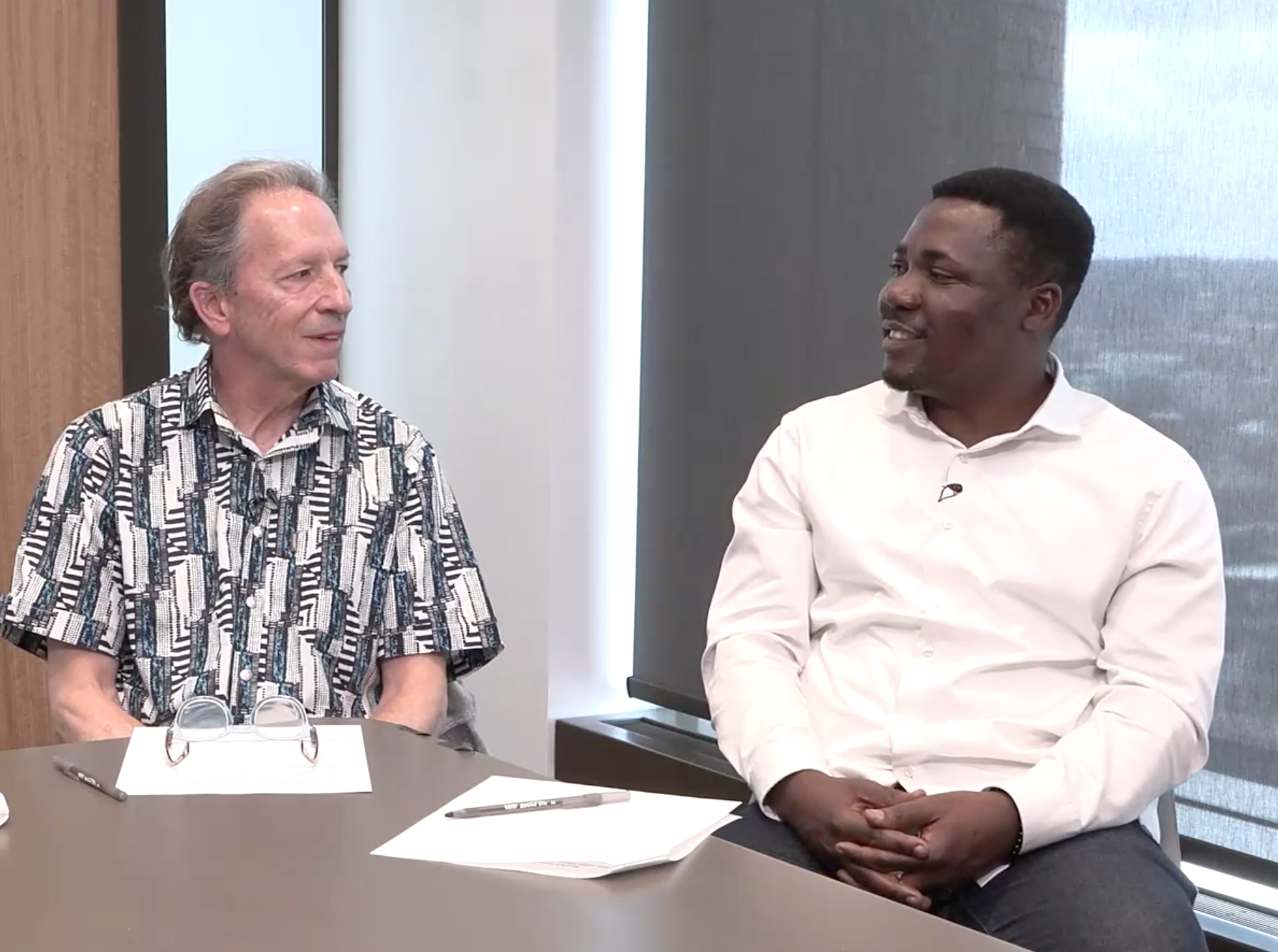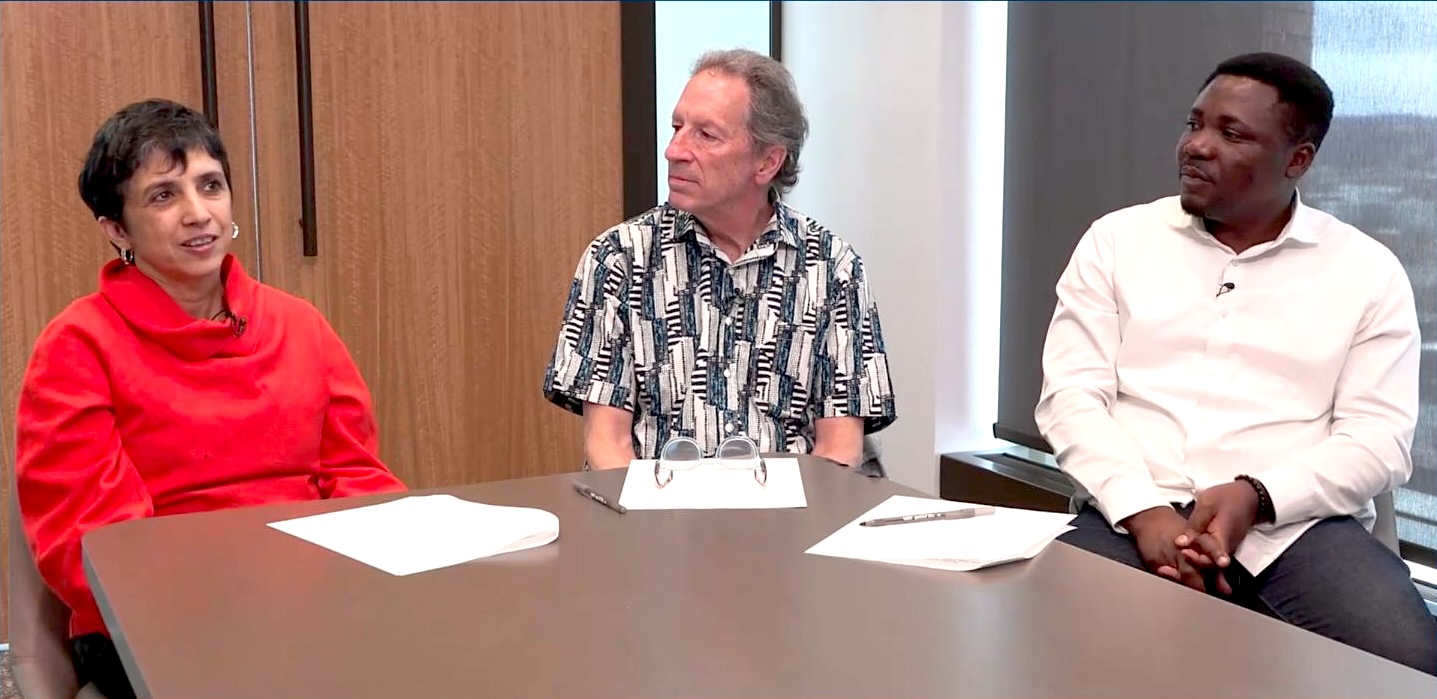Building In-Country Partnerships in Development Economics: Chris Udry, Francis Annan, and Rohini Pande share insights from Ghana and Beyond
Voices in Development: A Podcast from Yale's Economic Growth Center explores issues related to sustainable development and economic justice in low- and middle-income countries. This episode features Christopher Udry, Francis Annan, and Rohini Pande on ways development economists can form strong in-country partnerships to support actionable research.

Voices in Development: Building In-Country Partnerships in Development Economics • Transcript
Spotify | Apple Podcasts | Amazon | Subscribe
Much of the research on economic development in low- and middle-income countries, particularly in Africa, is led by researchers who are outsiders to the regions they study. While this outsider perspective can help them see elements of the social or economic structure less visible to those who are deeply embedded in local institutions, partnerships with individuals and communities living and working in the area provide crucial insights for both the research process and its application to policy.
In this episode of Voices in Development, Christopher Udry, Robert E. and Emily King Professor of Economics at Northwestern University, Co-Director of the Global Poverty Research Lab, and former director of the Yale Economic Growth Center, discusses the role of in-country partnerships in development economics research.
Udry’s interest in development economics began when he served as a member of the Peace Corps in Ghana. He has spent his career conducting extensive field research to understand rural economic activity in Sub-Saharan Africa.

Christopher Udry, Robert E. and Emily King Professor of Economics at Northwestern University and Co-Director of the Global Poverty Research Lab, and Francis Annan, Assistant Professor of Economics at the University of California, Berkeley.
In trying to understand the complex social, economic, and institutional barriers to economic advancement, development researchers benefit from collaboration with those living and working in the area. Udry recalls a conversation that produced a crucial insight for a project investigating the organization of household agriculture in southern Ghana, where plots farmed by women yielded much less than plots farmed by men. Udry and his colleagues surveyed farmers and discovered that men allowed their land to lay fallow for periods of time so that the soil could replenish its nutrients and become more fertile. In contrast, women farmed the same plot of land continuously. While presenting preliminary results to a group of women household farmers, Udry asked why they didn't fallow their land like their husbands. "They weren't able to fallow their land because if they fallowed it, they were likely to lose it," Udry said. "Because they didn't have control over the land. The land was their husband's family land. And if they weren't using it, the Chief would reallocate it to somebody else." Any intervention seeking to increase agricultural output would need to reckon with this gendered constraint.
In collaborating with in-country partners, Udry regularly shares his research findings but rarely makes policy recommendations.
I view my work as more trying to support my local collaborators in providing them with the resources and the tools and maybe the authority to make recommendations to government. So I view myself as sort of a cheerleader, maybe a coach, for the athletes who are going to do the real policy. – Christopher Udry
The collaborators that Udry works with include groups that are conducting randomized controlled trials and institutions seeking help from researchers to measure the effectiveness of a policy or program. But the in-country partnerships Udry has found most valuable in his own career are with scholars at academic institutions based in low- and middle-income countries, including the Institute of Statistical, Social, and Economic Research, or ISSER, at the University of Ghana. ISSER is carrying out the Long Term Ghana Socioeconomic Panel Survey, a cross-university collaboration with EGC and Northwestern’s Global Poverty Research Lab that aims to provide a scientific framework for a wide range of potential research on the country’s process of development.
Udry is optimistic about such opportunities for collaboration with the increasing numbers of development economists born, raised, and now doing research in Africa. “It changes the way we think about our work,” he says.
This episode also featured Rohini Pande, Henry J. Heinz II Professor of Economics and Director of the Economic Growth Center, and Francis Annan, Assistant Professor of Economics at the University of California, Berkeley.

L-R: Rohini Pande, Christopher Udry, and Francis Annan.
Francis Annan, who grew up in Ghana and studies digital financial markets, insurance, and firms, notes that involving in-country partners in the production of research data is essential because it can help reproduce meaningful results. “If the local institutions, the regulators, the users of this evidence are part of the production process for this evidence, it tends to make our lives easier,” he said.
As economists, we spend a lot of time building a lot of technical skills, analyzing data, trying to create an inference,” he said. “I don't think we put a lot of time in terms of the production of the data, which is really important – kind of going back to the foundations of how the data come about. This is where I think the idea of local scholars and local institutions plays a role – to carefully measure things that we intended to measure. – Francis Annan
Pande says that in-country partnerships with scholars in places like Ghana, India, and Nepal can be affected by the different ways universities approach research. In Ghana and many other low- and middle-income countries, scholars have heavy teaching loads and research is not a central part of their criteria for promotion. Local scholars may need additional funds and institutional support in order to actively conduct research.
In Pande’s view, development research requires the insights of both insiders and outsiders. Pointing to her own experience growing up in India and then spending her career studying institutions and power in developing countries, she says that insiders may not see their own privileged position within a socioeconomic hierarchy, while outsiders can also bring important perspectives when it comes to notions of justice or inclusion.
A lot of what we are trying to do is understand why individuals stay poor. But why do we focus on that question? I think the question that development economists choose to focus on does come from having a normative standpoint about what we think is the 'good life' or what we think people should enjoy or how they should live. And I think that's something that I see across the world are my colleagues, that they, I think, have kind of an ability to ask what I think of as the right question. And that's formed both by having a strong technical training, but importantly, also by spending time with a lot of local partners to understand from them, what is a good life or what are the right ways to lead your life? – Rohini Pande
About the Guests:
Francis Annan is Assistant Professor of Economics at the University of California, Berkeley. He is a J-PAL Affiliated Professor at MIT, the Scientific Lead and Co-Chair of the Retail Finance Distribution (ReFinD) Research Initiative at ISSER, and a Fellow at the Center for Development Economics and Policy (CDEP) and the Center for Environmental Economics and Policy (CEEP). Annan's research centers on development economics and microeconomic issues, with a focus on digital financial markets, insurance, and firms in sub-Saharan Africa, India, and the United States. He received his PhD in Sustainable Development (Economics Track) from Columbia University in 2018.
Rohini Pande is the Henry J. Heinz II Professor of Economics and Director of the Economic Growth Center, Yale University. She is a co-editor of American Economic Review: Insights. In 2018, Pande received the Carolyn Bell Shaw Award from the American Economic Association for promoting the success of women in the economics profession. She is the co-chair of the Political Economy and Government Group at the Abdul Latif Jameel Poverty Action Lab (J-PAL), a board member of Bureau of Research on Economic Development (BREAD) and a former co-editor of The Review of Economics and Statistics. Before coming to Yale, Pande was the Rafik Harriri Professor of International Political Economy at Harvard Kennedy School, where she co-founded Evidence for Policy Design. Pande received a PhD in economics from London School of Economics, a BA/MA in Philosophy, Politics and Economics from Oxford University and a BA in Economics from Delhi University.
Chris Udry is a development economist whose research focuses on rural economic activity in Sub-Saharan Africa. His current research examines technological change, risk and financial markets, gender and households, property rights, psychological well-being and economic decision-making and a variety of other aspects of rural economic organization. He is a Fellow of the Econometric Society and of the American Academy of Arts and Sciences, a Board Member of Bureau for Research and Economic Analysis of Development, and a research associate of the National Bureau of Economic Research.